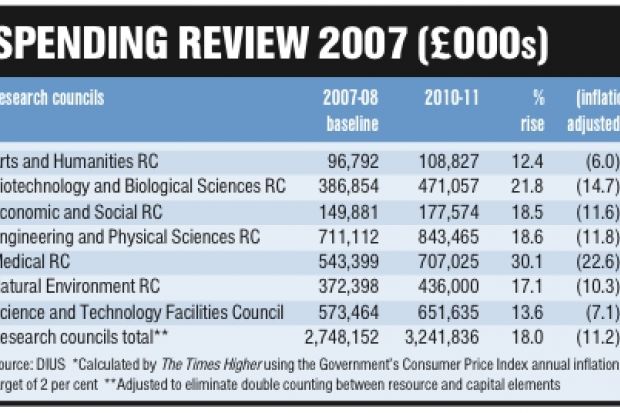The Government's commitment to fund the full cost of academic research could be waning, university research managers have warned after last week's Comprehensive Spending Review.
The Government said in 2004 that the seven research councils "should meet close to 100 per cent" of the full economic cost of research undertaken in universities by "the beginning of the next decade ... taking into account capital funding streams". This would mean that the indirect costs of research (such as investing in infrastructure) would be covered in the councils' research grants and would no longer have to be met from other sources by universities.
But after the announcement of the CSR, which determines government funding levels until 2011, the councils have confirmed they will not be able to pay more than the 80 per cent of true costs they have paid since 2005.
"It is disappointing that the level has not gone up," Philip Harding, chairman of the British Universities Finance Directors Group, told The Times Higher .
"I would have been amazed if it went to 100 per cent, but I was expecting to see some improvement ... even a few per cent would have indicated a clear statement of intent that 80 per cent was temporary," said Mr Harding, who is also Westminster University's finance director. "The danger is that 80 per cent will become established as the norm."
He predicted continuing battles with government departments (which are meant to pay full costs but do not always), the European Commission and industry over how much of the hidden costs of research universities should have to absorb.
"Originally the whole idea of sustainability in research was to get the full economic cost up to 100 per cent. It wasn't written in stone, but it was an expectation," said Lesley Sims, head of planning and resource allocation at Oxford University.
"We were in a dynamic landscape where the goal was 100 per cent full economic cost. There has been a slowing down of that goal," said Bob Bushaway, a senior research fellow at the Centre for Higher Education Management and Policy at Southampton University. "I would like to see a renewed commitment from the Treasury and research councils."
Under the CSR settlement, the Science Research Investment Fund, a temporary pot of capital money to fix the historic backlog of research infrastructure, was replaced with a permanent but smaller Capital Investment Fund. Mr Harding welcomed the permanence of the fund but said that if university capital funding was dropping, the research councils' full economic cost contributions should rise.
He said: "Research councils are making the call (not to fund at 100 per cent), justifying it on the basis that universities get a separate stream of capital, but if the capital component is dropping it rather undermines that argument."
The Department for Innovation, Universities and Skills and Research Councils UK both said the decision to keep funding at 80 per cent echoed earlier statements. "We will be at about 90 per cent (including capital funding) by the end of the CSR period," said Ian Diamond, chairman of RCUK.
A disappointing settlement for the Arts and Humanities Research Council was also criticised. Geoffrey Crossick, warden of Goldsmiths, University of London, said there seemed to be "no recognition" of the importance of arts and humanities research to the UK.
Council budgets, adjusted for inflation by The Times Higher , will rise in real terms from 22.6 per cent in the case of the Medical Research Council to 6 per cent in the case of the AHRC by 2010-2011.
zoe.corbyn@thes.co.uk </a> .
<P align=center>
Register to continue
Why register?
- Registration is free and only takes a moment
- Once registered, you can read 3 articles a month
- Sign up for our newsletter
Subscribe
Or subscribe for unlimited access to:
- Unlimited access to news, views, insights & reviews
- Digital editions
- Digital access to THE’s university and college rankings analysis
Already registered or a current subscriber?
